Some NHL skaters are known for racking up a lot of points in their careers. Some are known as defensive experts. Among the scorers, some are known as “playmakers” for their ability to pile up assists. This is a list of the “finishers,” the players whose greatest accomplishments were scoring goals, bending the twine, putting the biscuit in the basket. Players like Wendel Clark and Cam Neely.
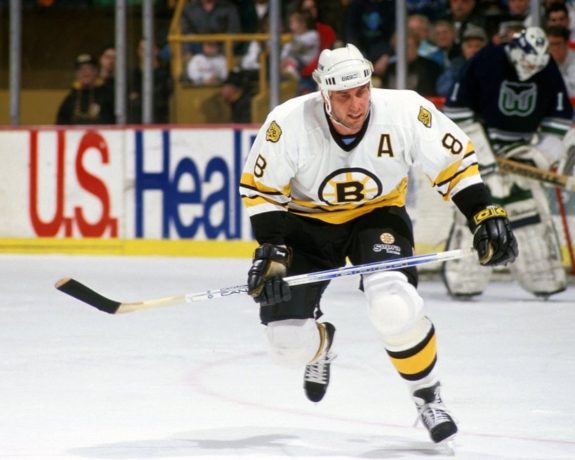
This isn’t a list of the players who scored the most goals in their careers – you’ll find that list here. You may be surprised by some of the names that are not on this list, including Wayne Gretzky, Gordie Howe, Jaromir Jagr, Mark Messier, and Mario Lemieux.
The Methodology
The rankings are based on a comparison of each player’s all-time points that were goals rather than assists. The goals-to-assists ratio is calculated by dividing the total number of goals by the total number of assists. (This is not the same as dividing a player’s total goals by or into his total points.) Players who scored more goals than assists will have a ratio greater than 1.00.
Players on this list rank among the top 500 goal scorers in the history of the NHL and only one has scored fewer than 200 goals in his career – so far (he’s still active). You’ll recognize some of the names and some might be completely unfamiliar to you. Near the top of the list, some of the names will make you say “Well, duh” (or the equivalent). But you’ll also find some surprises.
The Old Timers
Prior to 1936, only one assist was recorded for each goal. If an assist was recorded at all. During the 1936-37 season, up to three assists per goal were awarded. Since then, a maximum of two assists per goal has been the standard. (Source: Total Hockey, The Official Encyclopedia of the National Hockey League, 1st Edition 1998, Chapter 62 “The Evolution of NHL Statistics” by Ron Andrews.) For an interesting look at scorekeeping, take a look at “The Art of Keeping Stats.”
Here’s a list of who recorded more goals than assists while playing a substantial portion of their careers prior to the 1937-38 season:
- Cecil “Babe” Dye 4.060 goals-to-assists ratio (203 goals/50 assists)
- Cy Denny 2.775 (247/89)
- Nels Stewart 1.696 (324/191)
- Bill Cook 1.652 (228/138)
- Aurele Joliat 1.387 (269/194)
- Howie Morenz 1.322 (271/205)
- Charlie Conacher 1.302 (224/172)
- Herb Cain 1.073 (206/192)
- Busher Jackson 1.030 (241/234)
Of the players on this list, only two careers actually straddle the 1936-37 season. From 1929-20 through 1936-37, Busher Jackson scored 159 goals and recorded 131 assists. From 1937-38 through 1943-44, he scored 83 goals and was credited with 103 assists. If we count only his “modern” stats, Jackson doesn’t make the cut for this article.
Related: The Best NHL Players of All-Time, by Decade
Between 1933-34 and 1936-37, Herb Cain had 53 goals and 61 assists. From 1937-38 through 1945-46, his totals were 153 goals and 109 assists. Cain actually had a better goals-to-assists ratio after the 1937-38 cutoff than before. With 153 goals and 109 assists, his ratio (modern era only) jumps to 1.404, which would put him 2nd all-time.
Modern Era Goals-to-Assists Leaders, The Top 25
Since the 1937-38 season, more than 70 players have scored at least as many goals as assists (regular season, through the 2019-20 season). Here are the top 25, based on their goals-to-assists ratio:
1. Wendel Clark 1.410 goals-to-assists ratio (330 goals/234 assists)
Active from 1985-86 through 1999-00, Clark 11 played full and two partial seasons with the Toronto Maple Leafs. He also played for the Quebec Nordiques, New York Islanders, Tampa Bay Lightning, Detroit Red Wings, and Chicago Blackhawks.
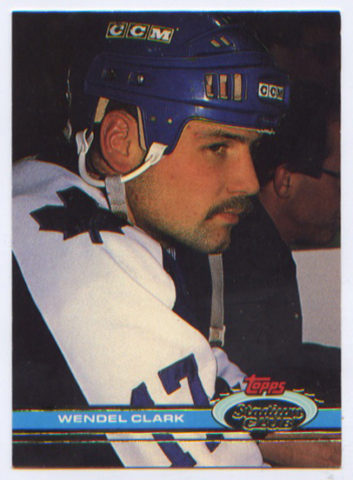
Clark recorded 13 career hat tricks and was a two-time All-Star. In 1993-94 he scored a career-high 46 goals in only 64 games for the Maple Leafs. Only in his first two seasons in Toronto did he lead the club in goals.
2. Blaine Stoughton 1.351 (258/191)
In addition to nine years in the NHL, Stoughton played three in the World Hockey Association (WHA). He led the NHL in goals in 1979-80. He played in the 1982 NHL All-Star Game. Stoughton was one of the original Hartford Whalers and led the team in scoring its first season.
3. Reggie Leach 1.337 (381/285)
Although he’s remembered primarily for his eight seasons with the Philadelphia Flyers, Leach also played for the Boston Bruins (who drafted him #3 overall in 1970), the California Golden Seals, and his final year with the Red Wings.
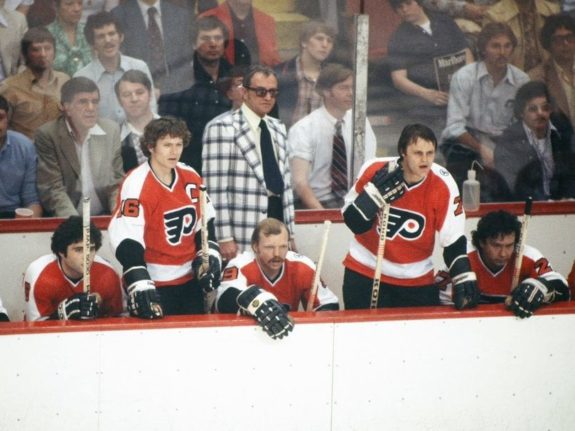
Leach was a member of the 1975 Stanley Cup Champion Flyers, led the league in scoring the following year, and played in a pair of All-Star Games.
4. Cam Neely 1.321 (395/299)
The long-time Bruin was originally drafted by the Vancouver Canucks (#9 overall, 1983) and played his initial three NHL seasons for that team. The Hall of Famer’s career was cut short by injury, forcing his retirement following the 1995-96 season. He still ranks as the sixth-best scorer in Bruins’ history. In his 10 seasons in Boston, he led the team in goals every season other than the two severely curtailed by injury (1991-92, 9 games played and 1992-93, 13 games).
5. Eric Daze 1.314 (226/172)
A member of the Blackhawks from 1994-95 through 2003-04 (and a single game the following year), he was Chicago’s 4th round draft pick (#90) in 1993. Back injuries cut short his career.
Related: What Happened to Eric Daze?
The 2002 All-Star Game MVP scored at least 20 goals in each season during which he played more than 20 games, hitting the 30-goal mark four times in those eight full seasons.
6. Peter Bondra 1.293 (503/389)
The first non-Canadian on the list, Bondra was born and raised in the Soviet Union, although he became a Slovak citizen (through his father’s Czechoslovakian roots) in 1994. The Washington Capital’s eighth-round pick (#156) spent 13-1/2 years with the club. He also played partial seasons for the Ottawa Senators, Atlanta Thrashers, and the Blackhawks. He broke the 50-goal barrier twice and was a five-time All-Star.
7. Maurice Richard 1.290 (544/422)
The NHL’s annual goal-scoring champion is awarded the Maurice “Rocket” Richard Trophy. If there had been such an award during his career, Richard himself would have won it four times and he tied for the league goal-scoring lead a fifth time. In his 18 NHL years, all with the Montreal Canadiens, he scored six overtime game-winners and 33 hat tricks. He was the first player in NHL history to score 50 goals in a season, which he accomplished in 50 games during the 1944-45 season.
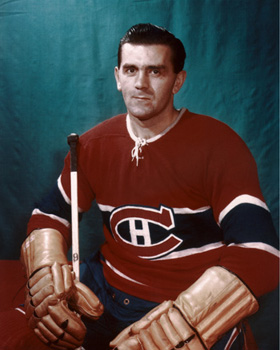
The Hall of Famer was named to 14 post-season All-Star teams and played on eight Stanley Cup winning teams. Although Richard was known as a fierce and physical player, he was twice rejected for military service during World War II.
8. Pavel Bure 1.278 (437/342)
The “Russian Rocket” fittingly slots in just after Richard. Nicknamed for his speed rather than any comparison to his predecessor on this list, Bure was a sixth-round selection (#113) of the Canucks in 1989. He made his NHL debut in 1991-92, winning the Calder Memorial Trophy as rookie of the year. In both 1999-00 and 2000-01, he led the NHL in goal-scoring, winning the Richard Trophy both years. Bure was inducted into the Hockey Hall of Fame in 2012, six years after he became eligible.
9. Rick Vaive 1.271 (441/347)
In 1981-82, Vaive became the first 50-goal scorer in the storied history of the Maple Leafs (a feat he accomplished three times in his career). He was drafted by the Canucks fifth overall in 1979 while a member of the WHA”s Birmingham Bulls. He was traded his rookie year to Toronto, where he spent seven seasons. Vaive later played for the Blackhawks and Buffalo Sabres.
10. Mark Parrish 1.263 (216/171)
The first US-born player on this list, his 11-year NHL career included stints with seven teams, not including the team that originally drafted him, the Colorado Avalanche (#79, 1996), or the Senators (with whom he signed a contract in 2011, but he never played a game for the team). Not a prolific scorer, he hit the 30-goal mark only once in his career (2001-02), when he also had 30 assists for 60 points, a career-high. He made one All-Star appearance in 2002.
11. Jeff Skinner 1.246 (258/207) *
Talk about starting out with a bang! Skinner was drafted seventh overall by the Carolina Hurricanes in 2010, won the Calder Trophy in 2010-11, and was the youngest skater to play in the All-Star Game that year, as an injury replacement for Sidney Crosby.
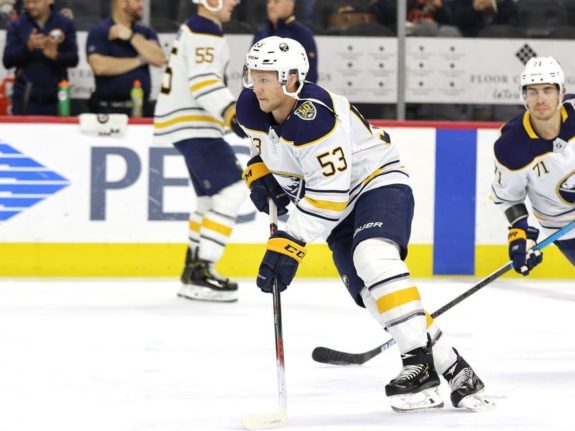
After eight years with the Hurricanes, Skinner has spent the past two in Buffalo, hitting the 40-goal mark for the Sabres in 2018-19.
12. Mark Hunter 1.246 (213/171)
One of the three Hunter brothers to play in the NHL (Dale and Dave), he was drafted seventh overall by the Montreal Canadiens. After four seasons with the Canadiens, he was traded to the St. Louis Blues (prior to the 1985-86 season), where he knocked out seasons of 44, 36, and 32 goals. Finishing his career with the Calgary Flames, Whalers, and seven games with the Capitals, he never came close to the success he saw with the Blues.
13. Alex Ovechkin 1.234 (706/572) *
What can you say about “Ovi” at this point in his career? He shows no signs of slowing down and, perhaps, may eventually hold the NHL record for goals scored. One of the few skaters on this list to play his entire career with one club (so far – and likely forever), he was drafted first overall in 2004 by the Capitals and has certainly lived up to that selection. Ovechkin has never scored fewer than 30 goals in a 15-season career, not even in the 48-game 2012-13 year. Check back in a few years and, based on recent seasons’ performance, you may find him much higher on this list.
14. Al Secord 1.224 (273/223)
Secord was drafted by the Bruins 16th overall and spent his first 2-1/2 years with the team before being traded to the Blackhawks during the 1979-80 season. His six full and two half seasons in Chicago (466 games) saw him produce 213 goals, while he potted only 60 in his other 300 games, split among the Bruins, Maple Leafs, and Flyers. His most notable season was 1981-82 when the Blackhawk winger scored 44 goals and spent 303 minutes in the penalty box. He’s the only player in NHL history to record over 40 goals and 300 PIMs in the same season.
15. Tim Kerr 1.217 (370/304)
Despite missing substantial time due to injury in six of his 13 seasons, Kerr managed to total 370 goals in his 655 games. While playing for the Flyers (with whom he spent all but 54 games if his career) he broke the 50-goal mark four straight seasons, 1983-84 through 1986-87. In the 1985 Playoffs, he scored four goals in a span of 8:16, a feat never (yet) matched.
16. Rick Martin 1.211 (384/317)
Drafted fifth overall by the Sabres in 1971, Martin played all but four of his 685 regular-season games with Buffalo, scoring 382 of his 384 goals for the club. In 1973-74 and the following season, he scored 52 goals. He came up one short of the 50-goal mark in 1975-76. He holds a number of team scoring records, including hat tricks, four-goal games, and 40- and 50-goal seasons. His career was cut short by a knee injury.
17. Petr Klima 1.204 (313/260)
Drafted in the 5th round (#86) by the Red Wings in 1983, he also played for the Edmonton Oilers, Lightning, Los Angeles Kings, and Pittsburgh Penguins. He defected to the US while playing with the Czech national team in West Germany in 1985. He broke the 30-goal mark in his 1st three seasons as a Red Wing (1985-88).
Related: Oilers History: The Importance of Jimmy Carson
Sadly, his career in Detroit was interrupted by substance abuse and disciplinary issues. He was part of the blockbuster trade (along with Adam Graves and Joe Murphy) to the Oilers that brought Jimmy Carson to the Red Wings.
18. Mickey Redmond 1.195 (233/195)
Undrafted, Redmond signed with the Canadiens prior to the 1967-68 season. He played for Montreal (and had his name engraved on the Stanley Cup twice) until a trade to Detroit in the middle of the 1970-71 season (with Guy Charron and Bill Collins for Frank Mahovlich). In 1972-73 he scored 52 goals and 51 the following season, only the third player (to that date) to have back-to-back 50-goal seasons. Back injuries forced him into retirement at the age of 28.
19. Ray Sheppard 1.190 (357/300)
A third-round pick (#60) of the Sabres in 1984, he scored 38 and 22 goals for the team in his 1st two seasons. After an injury-shortened 1989-90 season (18 games), he was sold to the New York Rangers for $1 and “future considerations.” After a 24-goal season with the Rangers, he signed with the Red Wings. He hit the 30-goal mark four straight years, including 52 in 1993-94, while in Detroit.
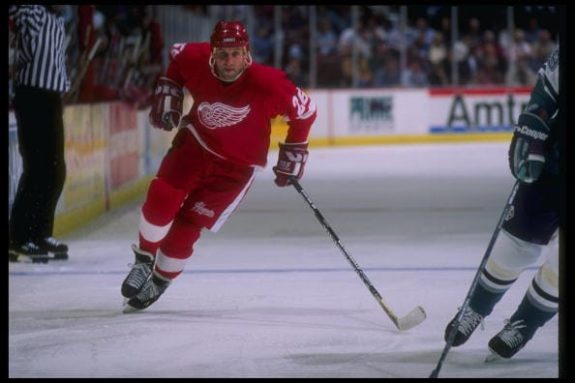
Sheppard also scored at least 20 goals in a season for the San Joe Sharks, Florida Panthers, and Hurricanes – 20-goal seasons for six different teams, second only to Bill Guerin, who scored at least 20 for seven teams.
20. Sylvain Turgeon 1.190 (269/226)
Drafted second overall by the Whalers in 1983, his 12-year career included stints with Hartford. New Jersey Devils, Canadiens, and Senators. He had seven seasons of at least 20 goals, including totals of 45, 40, 31, and 30 goals. He suffered an abdominal injury in 1986-87 and in that and the next eight seasons, he averaged only about 50 games. His last season in the NHL was 1994-95. Over the following seven years, he bounced around among eight teams in the IHL and in Europe.
21. Rick Nash 1.188 (437/368)
The Columbus Blue Jackets traded up to draft Nash first overall in 2002. After contentious negotiations, he inked what was then the richest rookie contract in NHL history just minutes before the signing deadline. He became the first top pick since Mario Lemieux (1984) to score a goal in his league debut. In his seconnd season, he scored 41 goals, tying Jarome Iginla and Ilya Kovalchuck for the Richard Trophy. That began a string of 11 straight 20+ goal seasons, including 40 goals with the Blue Jackets in 2008-09 and 42 with the Rangers in 2014-15. He retired at age 34 due to concussion-related symptoms.
22. Cam Atkinson 1.165 (198/170) *
Another Columbus draft pick (sixth round, #157), his 41 goals in 2018-19 tied the Blue Jackets team record (with Nash). After becoming a regular in the lineup in 2013-14, he has scored at least 20 goals in all but the injury- and COVID-shortened 2019-20 season (44 games played).
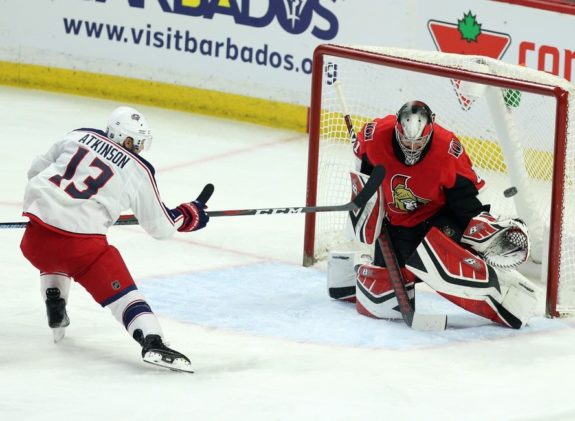
Atkinson is a two-time All-Star (2017, 2019). He finished top-10 in the league in goals twice (eighth in 2016-17, sixth in 2018-19), game-winning goals three times (eighth in 2014-15, second in 2016-17, fifth in 2018-19), shorthanded goals twice (fifth in 2016-17, fourth in 2018-19), and once in even-strength goals (ninth in 2018-19).
23. Adam Graves 1.146 (329/287)
Originally a Red Wing (drafted in the second round, 22nd in 1986), he was part of the 1989 trade with the Oilers that brought Carson to Detroit. He was a member of the 1989-90 Stanley Cup-winning Edmonton squad, as well as the Cup-winning Rangers in 1993-94. Ten of his 16 seasons were spent with the Rangers, where he scored at least 20 goals eight times. That includes his 52 goals in 1993-94, a team record at the time.
24. Brett Hull 1.140 (741/650)
Despite scoring 104 and 188 points in junior hockey and 60 and 84 in the NCAA, Hull was a sixth-round pick (#117) by the Calgary Flames. Other than his first season (five games in 1986-87 with Calgary) and his last season (five games in 2005-06 with the Phoenix Coyotes), he scored at least 20 goals, including three straight seasons of 70+ goals (1989-92) and five straight 50+ seasons (1989-94). His top goal-scoring season was 1990-91 when he netted 86. Hull is the only member of the five most prolific goal scorers in NHL history to appear on this list. The Hall of Famer’s name is on the Stanley Cup twice (1999 with the Dallas Stars, 2002 with the Red Wings). He joined the 50 goals in 50 games club in 1990-91 and repeated the following season.
25. Harry Watson 1.140 (236/207)
“Whipper” Watson started his NHL career with the Brooklyn Americans in 1941-42. He also played with the Red Wings, Maple Leafs, and Blackhawks. The 1943-44 and 1944-45 seasons were split between the Royal Canadian Air Force and Navy during World War II. In 14 NHL seasons, he scored 20 or more goals only four times, yet has his name is on the Stanley Cup five times, his first year in Detroit and four times with the Maple Leafs. In 1948-49, he led the Maple Leafs in goals (and points) and – remarkably – didn’t take a single penalty. He was inducted into the Hockey Hall of Fame in 1994, 37 years after his retirement.
* Active as of 2019-20
The Modern Era, The Rest of the Best
Another 41 players have scored at least as many goals as assists in their careers (minimum 200 goals):
- James Neal 1.129 (289/256) *
- Mike Gartner 1.129 (708/627)
- Evander Kane 1.126 (242/215) *
- Roy Conacher 1.124 (226/201)
- Errol Thompson 1.124 (208/185)
- Camille Henry 1.120 (279/249)
- Richard Zednik 1.117 (200/179)
- Bill Goldsworthy 1.097 (283/258)
- Jeff Carter 1.091 (610/560) *
- Ron Stewart 1.091 (276/253)
- Bobby Hull 1.089 (610/560)
- Steve Shutt 1.079 (424/393)
- Ron Ellis 1.078 (332/308)
- Glen Murray 1.073 (337/314)
- Darcy Rota 1.071 (256/239)
- Danny Gare 1.069 (354/331)
- Stephane Richer 1.058 (421/398)
- Eddie Shack 1.059 (239/226)
- Garry Unger 1.056 (413/391)
- James van Riemsdyk 1.056 (247/234) *
- Tony Tanti 1.051 (287/273)
- Donald Audette 1.044 (260/249)
- Mike Bossy 1.036 (573/553)
- Willi Plett 1.033 (222/215)
- Steven Stamkos 1.030 (422/410) *
- Mike Knuble 1.030 (278/270)
- Geoff Sanderson 1.029 (355/345)
- Dino Ciccarelli 1.027 (608/592)
- Ilya Kovalchuk 1.027 (443/433)
- Max Pacioretty 1.022 (280/274) *
- Jean Pronovost 1.021 (391/383)
- Keith Tkachuk 1.021 (538/527)
- Tony Granato 1.016 (248/244)
- Fredrik Modin 1.009 (232/230)
- Mike McPhee 1.005 (200/199)
- Alexandre Burrows 1.005 (205/204)
- Bill Guerin 1.005 (429/427)
- Joe Nieuwendyk 1.004 (564/562)
- Tony McKegney 1.003 (320/319)
- Vladimir Tarasenko 1.000 (214/214) *
- Paul Gardner 1.000 (201/201)
* Active as of 2019-20
The Future Top Finishers?
The lists above include only players among the top 500 goal scorers in NHL history. Some active players have scored more goals than assists so far in their careers, but aren’t in that top 500, including Kyle Palmieri (175 goals/163 assists), Michael Grabner (175/101), Brendan Gallagher (173/161), Anders Lee (172/129), and Auston Matthews (158/127). If Matthews continues on his current trajectory (1.244 goals-to-assists ratio), he’ll eventually break into the top 15.
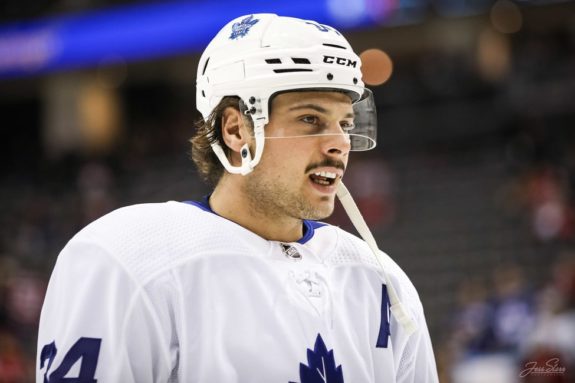
The player I expect to make this list soon is Patrik Laine (1.266, 138/109). He has top 10 potential. Check back and see where he lands once he cracks the top 500 goal scorers of all time. It should only take him another two or three seasons.
Statistics are from QuantHockey.